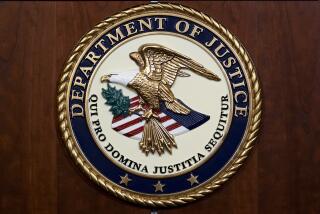Partisan Snub of Republican Katrina Inquiry Now Looks Petty
President Bush, the White House staff, Homeland Security Secretary Michael Chertoff, the Federal Emergency Management Agency and, of course, former FEMA director Michael D. Brown all take their lumps in the report on Hurricane Katrina issued last week by a special committee of House Republicans.
But the report also raises questions about the judgment of someone who was nowhere near the dysfunctional chain of command when the hurricane struck: House Democratic Leader Nancy Pelosi (D-San Francisco).
When House Republicans created the committee in September, Pelosi refused to appoint Democrats to the panel. She didn’t block five House Democrats from the Gulf Coast region from informal participation. But she did seek to discredit the investigation by barring any Democrat from officially taking part. “I am not going to, as leader, validate what I consider to be a whitewash,” she said in September.
Now that the special committee, under the chairmanship of Rep. Thomas M. Davis III (R-Va.), has finished its work (available at https://reform.house.gov), Pelosi’s decision looks petty, partisan and small.
Was the report Davis released last week incomplete, as some Democrats charged? Sure. It left open questions, particularly about the president’s role, that deserve further investigation.
But was the investigation a whitewash or a sham, as Democrats charged going in? Not even close.
Together with 10 Republican colleagues, Davis -- a thoughtful, independent legislator who chairs the House Government Reform Committee -- produced a serious, smart and tough report. It is systematic and forthright in its description of the failure of every level of government, and in particular every level of the Bush administration, to comprehend and respond to Katrina.
Operating on a tight timeline, the committee held nine hearings and reviewed more than 500,000 pages of documents. It reached conclusions that point toward dozens of specific reforms. But it also kept sight of the big picture, warning that more than four years after the Sept. 11 terrorist attacks, “America is still not ready” to cope with catastrophe.
Nor does the report exempt the White House or Bush. The report portrays an inexplicable failure at the White House to take initiative and resolve conflicting information or even to initially recognize the enormity of the crisis. It chides Bush for responding too passively, concluding “earlier presidential involvement might have resulted in a more effective response.”
Davis, describing his own conclusions, goes further. With the hurricane predicted more than two days in advance, Davis wonders why Bush and White House Chief of Staff Andrew H. Card Jr. remained on vacation, leaving only the deputy Homeland Security advisor in command at the White House. “What does that tell you?” Davis asks.
This clearly isn’t what Pelosi anticipated when she commanded Democrats to stay away from Davis’ panel. It’s easy to understand why her expectations were so different. House Republicans have largely abdicated their institutional responsibility to conduct oversight of the Bush administration.
In January, Rep. Henry A. Waxman (D-Los Angeles) issued a report contrasting the House GOP majority’s failure to probe almost any aspect of the administration’s performance with its tireless pursuit of allegations against President Clinton and his aides -- an effort that produced more than 1,000 House subpoenas. Waxman, the ranking Democrat on the government reform committee, was right to protest a double standard. But he was wrong to join his party’s boycott and accept the assumption that Davis would not conduct a legitimate investigation. In fact, the Democrats who informally participated praised Davis and other Republicans “for creating an atmosphere of constructive dialogue,” as Rep. Cynthia A. McKinney (D-Ga.), one of the House’s most liberal members, wrote in an attachment to the report.
The principal complaint from the participating Democrats was that the committee did not delve deeply enough into the White House role. It’s a fair point. Davis threatened to subpoena the White House when it rejected his requests for documents, but instead, over objections from the Democratic observers, he accepted a deal for much more limited access.
Nor did Davis subpoena Card or other top officials, even though the House Government Reform Committee, during the Clinton era, demanded testimony from three different White House chiefs of staff and four White House counsels. Davis accepted two briefings from Kenneth Rapuano, the second-tier official left in command as the hurricane struck.
Davis’ defense is that a lengthy subpoena fight with the White House would have prevented the committee from obtaining enough information to meet its Feb. 15 deadline for a report or to produce recommendations in time for action before this year’s hurricane season. Those are plausible concerns. But even Davis acknowledges the result is that the report doesn’t illuminate much about Bush’s actions during the crisis.
“It is a mystery to many of us what he knew, and when he knew it, and the White House went out of their way in their briefings not to reveal that,” Davis said.
Davis suspects Democrats want more detail on Bush’s performance to embarrass the president politically. But more precisely spotlighting the breakdowns in the White House could also generate greater momentum for systematic reform.
That’s why the strong work by Davis and his colleagues shouldn’t be the last word in Katrina inquiries. Pelosi was myopic in boycotting this panel, but she’s right that a government failure this profound deserves an independent commission. In the meantime, Pelosi should remember that even when Democrats suspect the deck is stacked, they retain an obligation to represent their constituents. Seeking to undermine the credibility of Davis’ investigation, she only tarnished her own.
*
Ronald Brownstein’s column appears every Sunday. See current and past Brownstein columns on The Times website at latimes.com/brownstein.
More to Read
Sign up for Essential California
The most important California stories and recommendations in your inbox every morning.
You may occasionally receive promotional content from the Los Angeles Times.










